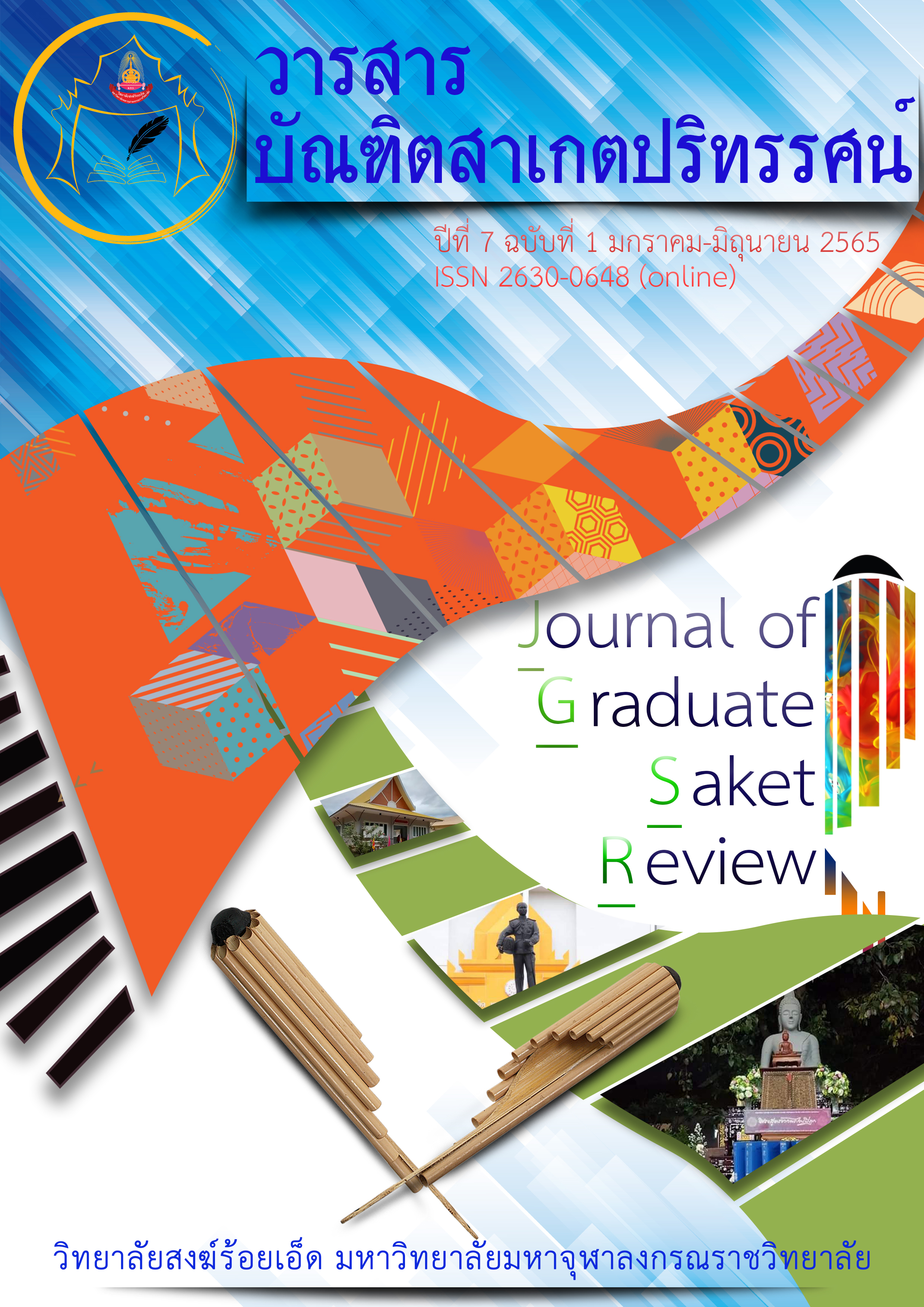Principles of Political Science in Tripitaka: Political Participation
Main Article Content
Abstract
Abstract
The principles of political participation appeared in the Tripitaka, especially the Suttantapitaka were consisted of 1) political participation in terms of power in which the prominent example is that disciple monks have engaged in governance, 2) political participation in terms of allocating state resources or something of social value in Gutathantasuttra in which citizens were allocated funds from the Lord Maha Wichitraj, 3) political participation in terms of public policy with the prominent example of Maghamanop and his companions. 4) political participation in terms of conflict, and 5) political participation in terms of compromise of interests with the prominent example were the scramble for water resources in the Rohini river of the Buddha relatives and the conflict between 2 monks of Kosampee city, and 6) political participation in terms of state and national administration with the example of the recruitment of leaders in Aggaññasutta.
Keywords: Principles of Political Science, Tripitaka, Political Participation
Article Details

This work is licensed under a Creative Commons Attribution-NonCommercial-NoDerivatives 4.0 International License.
เนื้อหาและข้อมูลในบทความที่ลงตีพิมพ์ในวารสารบัณฑิตสาเกตปริทรรศน์ ถือเป็นข้อคิดเห็นและความรับผิดชอบของผู้เขียนบทความโดยตรงซึ่งกองบรรณาธิการวารสาร ไม่จำเป็นต้องเห็นด้วย หรือร่วมรับผิดชอบใด ๆบทความ ข้อมูล เนื้อหา รูปภาพ ฯลฯ ที่ได้รับการตีพิมพ์ในวารสารบัณฑิตสาเกตปริทรรศน์ ถือเป็นลิขสิทธิ์ของวารสารบัณฑิตสาเกตปริทรรศน์ หากบุคคลหรือหน่วยงานใดต้องการนำทั้งหมดหรือส่วนหนึ่งส่วนใดไปเผยแพร่ต่อหรือเพื่อกระทำการใด ๆ จะต้องได้รับอนุญาตเป็นลายลักอักษรจากวารสารบัณฑิตสาเกตปริทรรศน์ ก่อนเท่านั้น
References
กุลธน ธนาพงศธร. (2520). หลักการกำหนดนโยบายของรัฐ. กรุงเทพมหานคร: โรงพิมพ์มหาวิทยาลัยธรรมศาสตร์.
คนอง วังฝายแก้ว. (2554). การกำเนิดแห่งรัฐที่ปรากฏในอัคคัญญสูตร. สืบค้นเมื่อ 20 พฤศจิกายน 2564, จาก https://www.gotoknow.org/posts/504187.
จรูญ สุภาพ. (2514). หลักรัฐศาสตร์. กรุงเทพมหานคร: โรงพิมพ์ไทยวัฒนาพานิช.
จิรโชค วีระสัย และคณะ. (2546). รัฐศาสตร์ทั่วไป. (พิมพ์ครั้งที่ 13). กรุงเทพมหานคร: มหาวิทยาลัยรามคำแหง.
ชัยอนันต์ สมุทวณิช. (2517). ความคิดอิสระ : รวมบทความทางการเมืองระหว่างปี 2511-2516. กรุงเทพมหานคร: พิฆเณศ.
ชินรัตน์ สมสืบ. (2539). การมีส่วนร่วมของประชาชนในการพัฒนาชนบท. นนทบุรี:มหาวิทยาลัยสุโขทัยธรรมาธิราช.
ณรงค์ สินสวัสดิ์. (2539). การเมืองไทย: การวิเคราะห์เชิงจิตวิทยา. กรุงเทพมหานคร: วัชรินทร์การพิมพ์.
___________. (2539). จิตวิทยาการเมือง. กรุงเทพมหานคร: วัชรินทร์การพิมพ์.
ทวีทอง หงษ์วิวัฒน์. (2527). การมีส่วนร่วมของประชาชน. กรุงเทพมหานคร: มหาวิทยาลัยมหิดล ศูนย์ ศึกษานโยบายสาธารณสุข.
นิรันดร์ จงวุฒิเวศย์. (2527). การมีส่วนร่วมของประชาชนในการพัฒนา. กรุงเทพมหานคร: มหาวิทยาลัยมหิดล.
ประยงค์ สุวรรณบุบผา. (2541). รัฐปรัชญา แนวคิดตะวันออก-ตะวันตก. กรุงเทพมหานคร: โอเดียนสโตร์.
ประสิทธิ์ กุลบุญญา. (2557). ความขัดแย้งและการจัดการความขัดแย้งตามหลักพระพุทธศาสนา, วารสารมนุษยศาสตร์และสังคมศาสตร์ มหาวิทยาลัยราชภัฏอุบลราชธานี. 5(1), 18-40.
มหามกุฏราชวิทยาลัย. (2525). พระไตรปฎกฉบับภาษาบาลี ฉบับสยามรัฐ. กรุงเทพมหานคร: โรงพิมพมหา มกุฏราชวิทยาลัย.
_________. (2539). พระไตรปฎกและอรรถกถาฉบับภาษาไทย ฉบับมหามกุฏราชวิทยาลัย.กรุงเทพมหานคร: โรงพิมพมหามกุฏราชวิทยาลัย.
พลศักดิ์ จิรไกรศิริ. (2531). การเมืองเบื้องต้น. กรุงเทพมหานคร: ภาควิชารัฐศาสตร์ คณะสังคมศาสตร์ มหาวิทยาลัยศรีนครินทรวิโรฒ ประสานมิตร.
ยุวัฒน์ วุฒิเมธี. (2526). หลักการพัฒนาชุมชนและการพัฒนาชนบท. กรุงเทพมหานคร: อนุเคราะห์ไทย.
วิสุทธิ์ โพธิแท่น. (2538). อะไรนะ...ประชาธิปไตย?. กรุงเทพมหานคร: มหาวิทยาลัยธรรมศาสตร์.
สมเด็จพระพุทธโฆษาจารย์ (ป.อ. ปยุตฺโต. (2546). พจนานุกรมพุทธศาสตร์ ฉบับประมวลธรรม. สืบค้นเมื่อ 20 พฤศจิกายน 2564, จาก https://84000.org/tipitaka/dic/d_item.php?i=273.
เสฐียรพงษ์ วรรณปก. (2543). คำบรรยายพระไตรปิฎก. กรุงเทพมหานคร : ธรรมสภา.
อานนท์ อาภาภิรม. (2528). รัฐศาสตร์เบื้องต้น. กรุงเทพมหานคร: โอ.เอส.พริ้นติ้ง เฮ้าส์.
Charles E.Lindblom. (1968). The Policy-Making Process Englewood. Cliffs,N.J.: Prentice-Hall.
David Easton. (1971). The Political System: AnInquiry into The State of Political Science, 2d ed.New York: Alfred A.Knopf.
Harold D.Lasswell. (1958). Politics: Who Gets What, When and How. Cleveland:The World Publishing Company.
J.D.B. Miller. (1962). The Natures of Politics. London:Gerald Duckworth.
W.J.M.McKenzie. (1969). Political and Social Science. Baltimore: Penguin,Inc..


